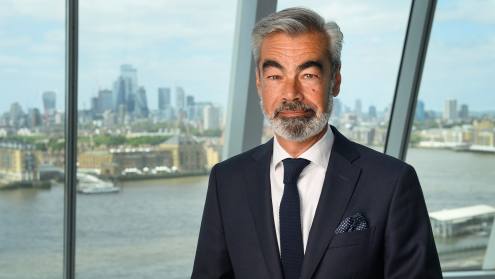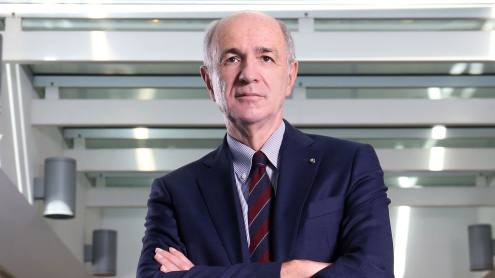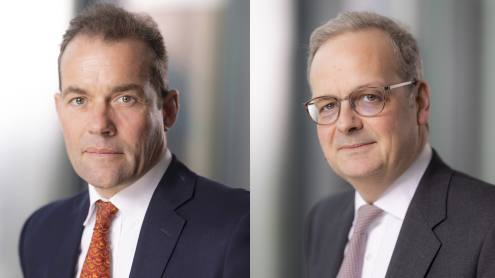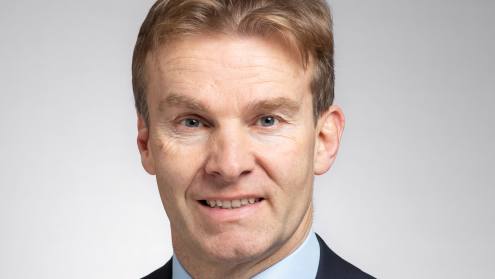The youngest-ever head of investment banking at Rand Merchant Bank (RMB), Rob Leon is leading the bank’s business across Africa and beyond at a time when the continent’s leading markets are transitioning from frontier status to must-haves for many investors.
“I think Africa has unbelievable potential,” he says. “As the continent continues to grow, as an African bank, we’d love to be part of it.”
Mr Leon has two roles. First, he is joint head of investment banking, a global role based in Johannesburg, South Africa. Second, he is joint head of the sponsor client group, a client coverage function that covers family offices, financial sponsors, real estate and infrastructure.
Career history: Rob Leon
- 2023 Joint global head of investment banking and joint global head of sponsor client segment, Rand Merchant Bank (RMB)
- 2021 Joint global head of investment banking, RMB
- 2017 Joint global head of leveraged finance, RMB
- 2011 Joint head of large sponsors (leveraged finance), RMB
- 2008 Transactor leveraged finance, RMB
The bank was founded as Rand Consolidated Investments in 1978 by three entrepreneurs, and became part of the larger FirstRand group in 1998. Mr Leon believes that RMB retains the entrepreneurial mindset of its roots — a culture of problem-solving, agility and building businesses up permeates the institution. FirstRand, meanwhile, is one of the largest financial services groups in Africa by market capitalisation.
Big deals
The bank’s role across the continent is apparent from its involvement in three of The Banker’s African Deals of the Year 2023. RMB was joint bookrunner for the €700m debut bond issue by Bank of Industry, Nigeria’s oldest and largest development finance institution. It was also the first euro-denominated bond issue guaranteed by the Nigerian government, indicating its importance to the country as a whole. Additionally, RMB was financial adviser to the restructuring of Nigeria’s BUA Foods, leading to an initial public offering that valued BUA as the country’s second-largest consumer goods company by market value.
Mr Leon highlights the third deal — a R1.1bn ($58m) gender-linked bond issued by South African industrial enterprise Barloworld. RMB was the sole lead arranger and sustainability adviser for the issue, which ties pricing to two key performance indicators: gender diversity in senior leadership, with a target of 50% of positions held by women; and increasing the proportion of black women-owned businesses in Barloworld’s supply chain.
RMB worked with the issuer to build a framework that identifies the importance of gender diversity to the company, and creates a framework to offer similar instruments in the future. The bank also worked with an anchor investor to align the deal structure with the investor’s social commitments.
“What I like about these deals is they are [market] firsts,” says Mr Leon. “The Barloworld issue bridges the funding gap for a business, but being gender-linked is the first of its kind in Africa. I think it showed our connection to the business and the client in terms how it was thinking about its own gender diversity profile, which was something that was really important to Barloworld. It was willing to put its name out there, and we hope it’ll be the first of many.
“The African continent, and the rest of the world, needs more gender diversity, and I think Africa is a turning point where these things are now in the conversation. The investor world is very interested in it.”
The Barloworld bond was well-received by the market, with the issue oversubscribed and pricing competitively against the company’s conventional bonds, and has triggered considerable interest from investors and corporates alike, Mr Leon says.
Gender diversity is increasingly raised by clients, as more women enter the workforce and companies look to bring more into senior positions. Pressure from the buy side is also a factor, with deal pricing often improving as targets are met, creating a financial incentive as well as a moral imperative, he explains.
Environmental expertise
RMB, which Mr Leon describes as “a transition bank”, has built up a green financing team across the entire bank over the past few years. The bank sees opportunities working with businesses across the continent — from coal miners in South Africa to Nigeria-based oil and gas companies — on the transition to net-zero emissions.
While green bonds are taking off strongly in Africa, Mr Leon sees potential in green deposits, as well as sustainable infrastructure development, particularly as South Africa looks to expand its grid with renewable resources. “Three to five years from now, I don’t think we will see many issuances that don’t have some kind of sustainability-linked component to them,” he says.
The past years have seen private companies increasingly step into the energy sector in South Africa to provide electricity generation in particular, filling a gap in the market created by the dysfunction of state utilities. ‘Load shedding’ — rotating power outages — has become a major issue in the country and a bugbear for its industrial enterprises.
RMB has been at the forefront of financing this budding sector. Private power projects it is backing include three solar units with a total capacity of 30 megawatts (MW) for gold miner Harmony; the 89MW Castle Wind Farm for mining and metals company Sibanye-Stillwater; and South Africa’s first utility-scale, private, wheeled wind energy project that will supply 69MW over 20 years to a green hydrogen plant run by chemicals company Sasol.
“It’s nice to see the private sector stepping in, in order to make sure that service delivery still happens, particularly in South Africa,” Mr Leon says. “Corporates are taking the reins and aggressively going into the infrastructure space. We’re seeing it in renewable energy and electricity generation, but there’s also a lot happening in water purification, ports, rail and roads. While it’s a great opportunity for the bank, as corporate citizens who reside in South Africa, we also feel that it’s an imperative for us to be supportive.”
While the first private power projects were structured in a fairly bespoke manner, a standardised model that can be replicated by the market is likely to emerge as more corporates become involved, he adds.
Expanding markets
Mr Leon is bullish about the outlook for RMB’s key African markets, despite Ghana having defaulted on most of its external debt in December 2022 — an event that has put other sovereign issuers and state-owned entities across the continent “on the back foot in terms of coming to market”, he says. But issues have continued, and mergers and acquisitions, as well as private financing deals, are lively. With Ghana now backed by a three-year $3bn International Monetary Fund deal, this “interesting” market will see more opportunities, he adds.
RMB has a substantial presence in Nigeria, where its business has been thriving. The bank is also present in Ethiopia, which is the second-most populous country in Africa. Despite the latter’s ongoing conflict, Mr Leon says that it “will be in a fundamentally different place” in 20 years’ time, and clients are already paying attention.
The scale of the investor pools and multinationals in the US was something that we wanted to get closer to
Mr Leon is upbeat about South Africa’s potential, while acknowledging the serious challenges it faces. The economy of RMB’s home market has underperformed over the past decade and unemployment now runs at 35%. Yet he sees the way the private sector has taken the lead in development in recent years as a positive sign for the future.
“The number of potholes — literally and figuratively — that one has to drive through is difficult,” he says. “But I believe that we have some of the most resilient people on earth. Our energy transition will be faster than almost any other nation’s due to sheer necessity and I’m confident that we’ll become more self-sustaining.”
Such is the interest in investment across the continent that in February 2023, RMB established a representative office in New York “to facilitate business flows into Africa”. The office aims to work with dollar-based multinationals with African subsidiaries, non-governmental organisations and US businesses with no current African presence that intend to do business on the continent. The bank sees the move as building on and deepening long-standing US engagement in Africa, something that he says is difficult to coordinate remotely from South Africa.
“The scale of the investor pools and multinationals in the US was something that we wanted to get closer to,” he continues. “Africa has a growing young population and an emerging middle class. They want to consume goods, they want [connectivity], they want healthcare — all of which US corporations are fantastic at providing.”
Inbound investment to Africa is now global — not just the US, but from the Gulf Co-operation Council, China and India. Mr Leon asserts that European companies’ experience in developing renewable and nuclear power can be brought to bear in building such infrastructure in Africa. Meanwhile, RMB is also helping South African clients expand beyond the continent, particularly in the UK.
Mr Leon is excited about the opportunities he sees ahead. “I love it when a client says, ‘Listen, I’ve got a problem’,” he says. “They may have a specific issue, or they want to grow. My brain starts ticking when those things happen, and this role gives me a great opportunity to help.”







